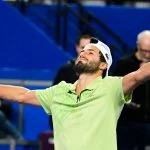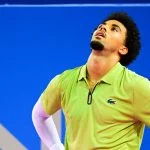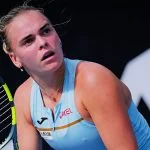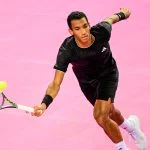Selfless Suárez Navarro: “I value the privileged life that I have”
Tennis players do live in a bubble, but when the coronavirus pandemic struck they showed they could get back to real life in order to help others. Carla Suárez Navarro shares her experience at the food bank of Las Palmas.
 Spain’s Carla Suarez Navarro has been working at a food bank in her hometown to help less fortunate ones deal with the Coronavirus.
Spain’s Carla Suarez Navarro has been working at a food bank in her hometown to help less fortunate ones deal with the Coronavirus.
The Spaniard, a former World No.6 and seven-time Grand Slam singles quarter-finalist, decided to go and work at the food bank of her city of Las Palmas in the Gran Canaria Island during the lockdown and she is sharing her experience with Tennis Majors.
Suárez Navarro joins other players who feel a collective desire to help the world during the ordeal. Novak Djokovic and his wife Jelena, via their foundation, gave 1 million euros to Serbia for medical equipment and another undisclosed amount to Lombardia in Italy. Roger Federer and his wife Mirka, via their foundation, gave one million dollars to get meals to children in Africa as schools closed due to the Covid-19 outbreak. Additionally, they gave one million Swiss francs to the most vulnerable families in Switzerland. Rafael Nadal joined Paul Gasol to launch the #NuestraMejorVictoria initiative for the Red Cross in hopes to raise eleven million euros for the country.
Aisam-ul-Haq Qureshi has been financing and delivering ration bags in Pakistan. Grigor Dimitrov donated ventilators to a hospital in his hometown of Haskovo in Bulgaria, as did Simona Halep for the cities of Bucharest and Constanta in Romania. Serena Williams mobilized her resources to donate 45,000 masks each day to the communities of Los Angeles, California and West Palm Beach, Florida, with the bulk of the donations going to the families of health workers.
Doubles star Kevin Krawietz, reigning Roland-Garros champion, went to take shifts at the supermarket Lidl in Germany, while his on-court partner Andreas Mies was delivering fruits to essential workers and communities in need.
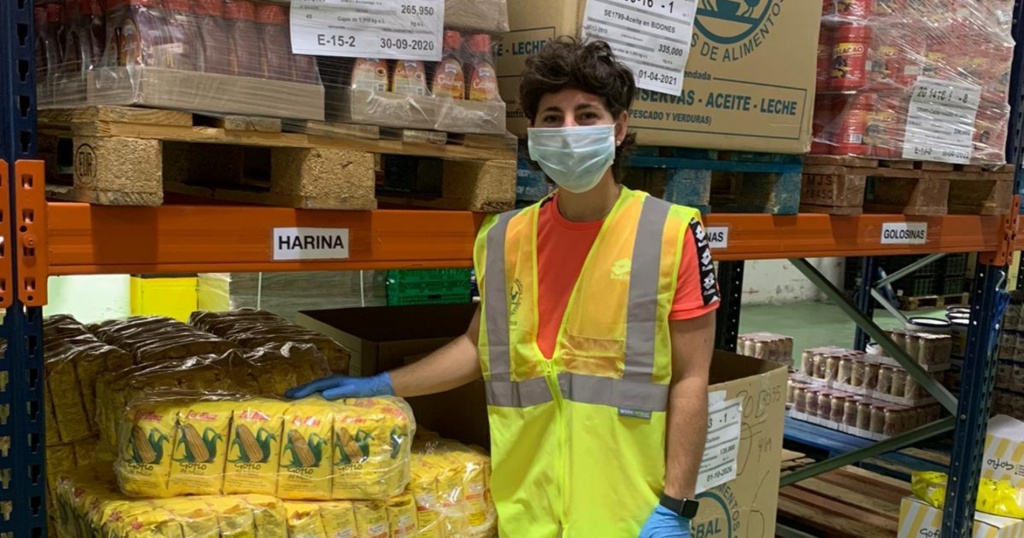
There have been many initiatives, and in this Tennis Majors exclusive Carla Suarez Navarro sheds some light on what compelled her to contribute to the cause, and what valuable lessons she learned from the experience. The Spaniard also shares her thoughts on the future of tennis, a future even more blurry for her as she had planned to retire at the end of the 2020 season.
What was the situation in Las Palmas during the lockdown?
“In Las Palmas, it has always been a bit better compared with the rest of Spain. Being an island, with restrictions on air travel, very few people were able to come here unless they had a major reason such as coming back home. After almost 40 days in lockdown, we were able to go outside at certain hours to exercise. You feel relieved after that. Right now we are allowed to visit our families and friends in groups no larger than 10 people. You can feel the change. Anyway, we try to do everything following the health recommendations.”
How did you decide to join and help the food bank?
“I knew it could be a great way to help people in need. Being at home I couldn’t do much apart from spreading the word on social media or making a donation. I felt inside myself that I wanted to be more involved. Helping others should be a priority for everyone, many families are having a hard time these days so I felt it was the moment to give a helping hand. I decided to contact the food bank and serve as a volunteer. They were very nice accepting me into their team. You feel personal satisfaction knowing that, in moments of difficulty, there are many ways to contribute.”
What are your daily tasks?
“At the food bank, our shifts begin at 9.00 am. We clean and organize the warehouse so that the vehicles and the workers can operate easily inside. Around 9.30 am we receive the orders we have to prepare for different Non-Governmental Organizations and associations which deliver the food to people in need. There are lots of products to organize so we need to be precise. Around 12.45 pm we finish our duties and before going home, we pick up all the empty boxes to leave the warehouse tidy. We work from Monday to Friday in four-hour shifts (9.00 to 13.00).”
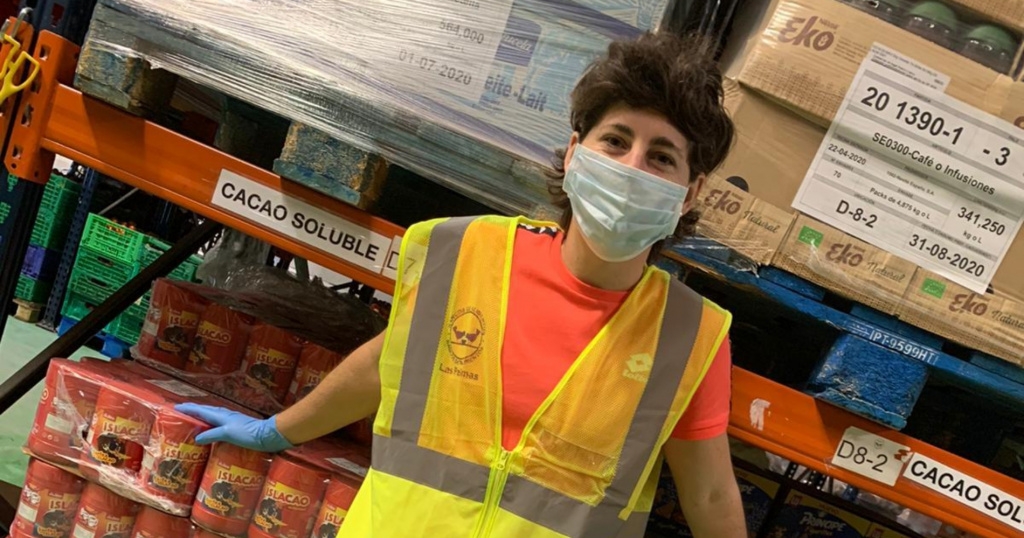
What are the main things you’ve taken out of this experience?
“Selfless help is real. There is huge solidarity within people. Despite losing their jobs, the priority for many was to come to the warehouse and alleviate the situation for people in need. I value the privileged life that I have. That’s one of the main insights I can take out of this experience.”
What was the feedback you received from the people?
“They received me very kindly. No matter what your job is, no matter what your popularity is, your hands are there to help. We are a great team and every minute spent at the warehouse can make a difference. That’s the main point. All the staff working at the food bank in Las Palmas are volunteers. All of them are people driven by their desire to help others. Many people contributed via donations, many bought food and brought it to the warehouse. Seeing those examples so close from home urges people to help. It is something really important and needed in our society. I’ve been working at the food bank for six weeks. On Friday I’m traveling to Barcelona, so this Thursday will be my last day at the warehouse. My intention is to keep coming to the food bank every time I visit Las Palmas. Maybe I can help as well at the food banks in Barcelona.”
Have you been able to train at all during those weeks?
“I did some fitness at home. Space and the material are limited but enough to keep my fitness condition. A local gym lent me a stationary bike so I did many spinning sessions. From May 11 I was allowed to play on a tennis court so I trained three days a week. Right now the situation is much better given that I can use the courts and the gym outside the home.”
Do you think, if tennis resumes this year, it’s going to be possible for the players to get back at the desired level after so many weeks without normal training?
“I think we have plenty of time to be fit. If tennis resumes, we will have had something similar to an extended preseason but the discipline and the commitment of players will let them be back on a great level. Considering that tennis resumes in 2020, which I see very difficult.”
It’s maybe extra special for you because you had planned to retire this season: could you share what’s been your thought process about it?
“It was a very personal, meditated decision. When I look back, my career makes me feel very proud. I’ve enjoyed the ride and lived through magnificent moments. I’ve been on Tour for many years and just want to experience different things in life. Obviously, this situation has been difficult for me. Being aware that many events were canceled during the season I planned to retire. The worldwide pandemic we’re living in is surreal. In this situation, tennis is not the most important thing for anybody. I’ll see how things go during the next few months to decide about my future.”
How do you think tennis is going to be after the crisis: different, or not? Would you want to see some things change?
“Yeah, I think some aspects will change. It’s hard to say specifically because our sport is special in many ways. We travel worldwide through 11-month seasons. Our Tour simply cannot take place at the moment. With all the quarantine and lockdown situation, that seems a bit difficult. It seems that the sports crowd as we know it won’t be there for a while. Maybe we need to avoid some gestures that are normal nowadays: handshakes with our opponents and umpires, towels, and ball kids … We will have to follow the advice from experts, that’s the most important thing.”






